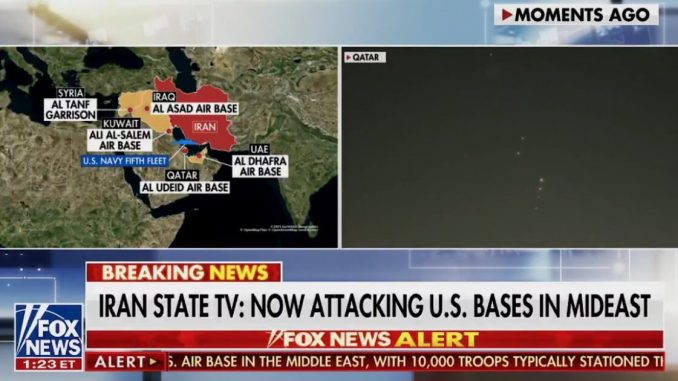
| Published June 23, 2025
Iran has launched a bold but calculated missile strike targeting the U.S.-operated Al-Udeid Air Base in Qatar—its most direct attack on American forces in years. The assault, reportedly involving dozens of ballistic missiles, was framed by Tehran as symbolic retaliation for recent U.S. strikes on Iranian nuclear facilities. While the missiles were intercepted with no casualties reported, the incident marks a dramatic escalation in U.S.-Iran tensions, testing Washington’s resolve and putting Gulf allies on high alert.
🎯 Objective & Symbolism
Iran dubbed the operation “Annunciation of Victory” (also seen as “Glad Tidings of Victory”), symbolically matching the number of missiles launched to the number of U.S. bombs used on its nuclear sites during Operation Midnight Hammer earlier that week.
✅ Outcome: Intercepts & Casualties
-
All Iranian missiles were intercepted by Qatari air defenses; no casualties or damage were reported.
-
A U.S. DoD official affirmed the strike was “largely symbolic,” underscoring Iran’s intent to retaliate without provoking major escalation.
🏛️ Diplomatic & Regional Reaction
-
Qatar strongly condemned the strike as a violation of its sovereignty and airspace.
-
Several Gulf states (Saudi Arabia, UAE, Bahrain, Kuwait, Iraq) closed airspace and issued diplomatic statements urging calm.
-
Analysts noted Iran’s pre-notification strategy is reminiscent of its 2020 missile strike on U.S. bases, designed to allow an “exit ramp” and avoid unintended full-scale escalation.
⚖️ U.S. Response
-
President Trump convened a White House Situation Room session with senior security officials to assess the implications
-
The administration declined immediate retaliation, viewing the strike as a controlled, low-casualty symbolic gesture
-
The State Department advised U.S. citizens in Qatar to shelter in place; DHS issued a domestic threat warning.
-
Congressional debate resumed: GOP leaders backed Trump’s authority, while some Democrats invoked the War Powers Resolution to challenge executive military action.
 Implications
Implications
-
Strategic Signaling
Iran showcased its missile reach and intent to retaliate for U.S. actions, without triggering a full-scale war—demonstrating both strength and restraint. -
Erosion of Gulf Security Perception
Gulf nations like Qatar are reminded of their vulnerability, prompting potential reassessments of military alliances and air defense readiness. -
Test of U.S. Resolve
Washington faces pressure to respond, but also must weigh escalation risks. The incident challenges its deterrence credibility in the region. -
Diplomatic Tightrope
Iran’s advance warning to Qatar suggests a desire to avoid broader fallout—hinting at backchannel diplomacy even amid confrontation. -
Domestic Political Fallout
In the U.S., the incident has reignited debate over presidential war powers and military engagement without congressional approval. -
Increased Regional Volatility
Neighboring states closed airspace and issued security alerts—underscoring fears of a broader regional conflict. -
Precedent for “Controlled Retaliation”
The strike mirrors Iran’s 2020 attack on U.S. forces in Iraq—suggesting a pattern of calibrated escalation intended to shift red lines without direct confrontation.
💬 Overall Takeaway:
Iran’s missile strike on the U.S. base in Qatar marks a new chapter in a long-simmering confrontation—one that combines military force with strategic calculation. While no lives were lost, the message was unmistakable: Tehran is prepared to hit American interests directly when provoked. The Biden administration’s measured response, regional unease, and growing congressional debate all point to a precarious balance. As tensions deepen, the Gulf becomes a high-stakes arena where even symbolic attacks risk spiraling into broader conflict.




